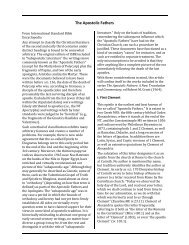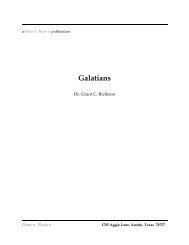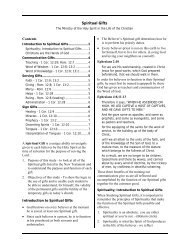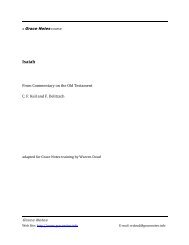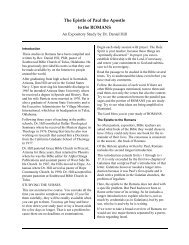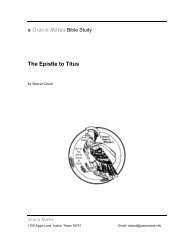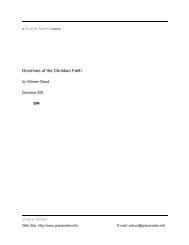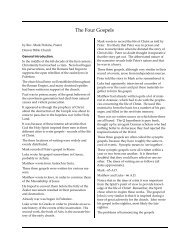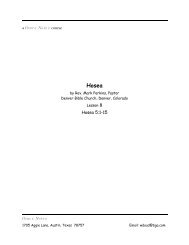Song of Solomon - Grace Notes
Song of Solomon - Grace Notes
Song of Solomon - Grace Notes
Create successful ePaper yourself
Turn your PDF publications into a flip-book with our unique Google optimized e-Paper software.
SONG OF SOLOMON Page 29By C. F. Keil and F. Delitzscha <strong>Grace</strong> <strong>Notes</strong> studysuch a place, and would rather escape awayfrom it, he relieves her from her fear andbashfulness, for he covers her with his fearinspiring,awful, and thus surely protecting,banner; and this banner, which he waves overher, and under which she is well concealed, is“love.” דֶּ גֶּ ל (from גַ ל ,דָ to cover) is the name <strong>of</strong> thecovering <strong>of</strong> the shaft or standard, i.e., pannus,the piece <strong>of</strong> cloth fastened to a shaft. Like apennon, the love <strong>of</strong> the king hovers over her;and so powerful, so surpassing, is the delight <strong>of</strong>this love which pervades and transports her,that she cries out:5 Support me with grape-cakes,Refresh me with apples:For I am sick with love.<strong>Song</strong> 2:5. She makes use <strong>of</strong> the intensive formas one in a high degree in need <strong>of</strong> thereanimating <strong>of</strong> her almost sinking life: סִ ֹּמֵ ְך isthe intens. <strong>of</strong> מַ ְך ,סָ to prop up, support, or, ashere, to under-prop, uphold; and פֵ ד ,רִ theintens. <strong>of</strong> רָ פַ ד (R. ,(רף to raise up from beneath(vid., at Prov. 7:16), to furnish firm ground andsupport. The apple is the Greek attribute <strong>of</strong>Aphrodite, and is the symbol <strong>of</strong> love; but here itis only a means <strong>of</strong> refreshing; and if thoughts <strong>of</strong>love are connected with the apple-tree (<strong>Song</strong>2:3; 8:5), that is explained from Shulamith’srural home. Böttcher understands quinces;Epstein, citrons; but these must needs havebeen more closely denoted, as at Prov. 25:11,אֲ שִ ישות expression. by some addition to the(from שַ ש ,אָ to establish, make firm) are (cf. Isa.16:7; Hos. 3:1) grapes pressed together likecakes; different from ֹּמּוקִ ים ,צִ dried grapes (cf.fig-cakes (Arab. dabbûle, a mass pressed ,(דְׁ בֵ לָ הtogether), and πλ ῦς, placenta, from thepressed-out form. A cake is among the gifts (2Sam. 6:19) which David distributed to thepeople on the occasion <strong>of</strong> the bringing up <strong>of</strong> theark; date-cakes, e.g., at the monastery at Sinai,are to the present day gifts for the refreshment<strong>of</strong> travellers. If Shulamith’s cry was to beunderstood literally, one might, with Noack,doubt the correctness <strong>of</strong> the text; for “lovesickness,even in the age <strong>of</strong> passion andsentimentality, was not to be cured with rosesand apples.” But (1) sentimentality, i.e.,susceptibility, does not belong merely to theRomantic, but also to Antiquity, especially inthe Orient, as e.g., is shown by the symptoms <strong>of</strong>sympathy with which the prophets wereaffected when uttering their threatenings <strong>of</strong>judgment; let one read such outbreaks <strong>of</strong>sorrow as Isa. 21:3, which, if one is disposed toscorn, may be derided as hysterical fits.Moreover, the Indian, Persian, and Arabic erotic(vid., e.g., the Romance Siret ‘Antar) is assentimental as the German has at any timebeen. (2) The subject <strong>of</strong> the passage here is notthe curing <strong>of</strong> love-sickness, but bodilyrefreshment: the cry <strong>of</strong> Shulamith, that she maybe made capable <strong>of</strong> bearing the deep agitation<strong>of</strong> her physical life, which is the consequence,not <strong>of</strong> her love-sickness, but <strong>of</strong> her lovehappiness.(3) The cry is not addressed(although this is grammatically possible, sinceto the (סַ ֹּמֵ כְׁ נָ ה אֹתִ י = rule, is, according to סַ ֹּמְׁ כּונִיdaughters <strong>of</strong> Jerusalem, who would in that casehave been named, but to some other person;and this points to its being taken not in a literalsense. (4) It presupposes that one came to thehelp <strong>of</strong> Shulamith, sick and reduced toweakness, with grapes and apple-scent torevive her fainting spirit. The call <strong>of</strong> Shulamiththus means: hasten to me with that which willrevive and refresh me, for I am sick with love.This love-sickness has also been experienced inthe spiritual sphere. St. Ephrem was once soovercome by such a joy that he cried out: “Lord,withdraw Thine hand a little, for my heart is tooweak to receive so great joy.” And J. R. Hedinger(†1704) was on his deathbed overpoweredwith such a stream <strong>of</strong> heavenly delight that hecried: “Oh, how good is the Lord! Oh, how sweetis Thy love, my Jesus! Oh, what a sweetness! Iam not worthy <strong>of</strong> it, my Lord! Let me alone; letme alone!” As the spiritual joy <strong>of</strong> love, so mayalso the spiritual longing <strong>of</strong> love consume thebody (cf. Job 19:27; Ps. 63:2; 84:3); there havebeen men who have actually sunk under alonging desire after the Lord and eternity. It is



